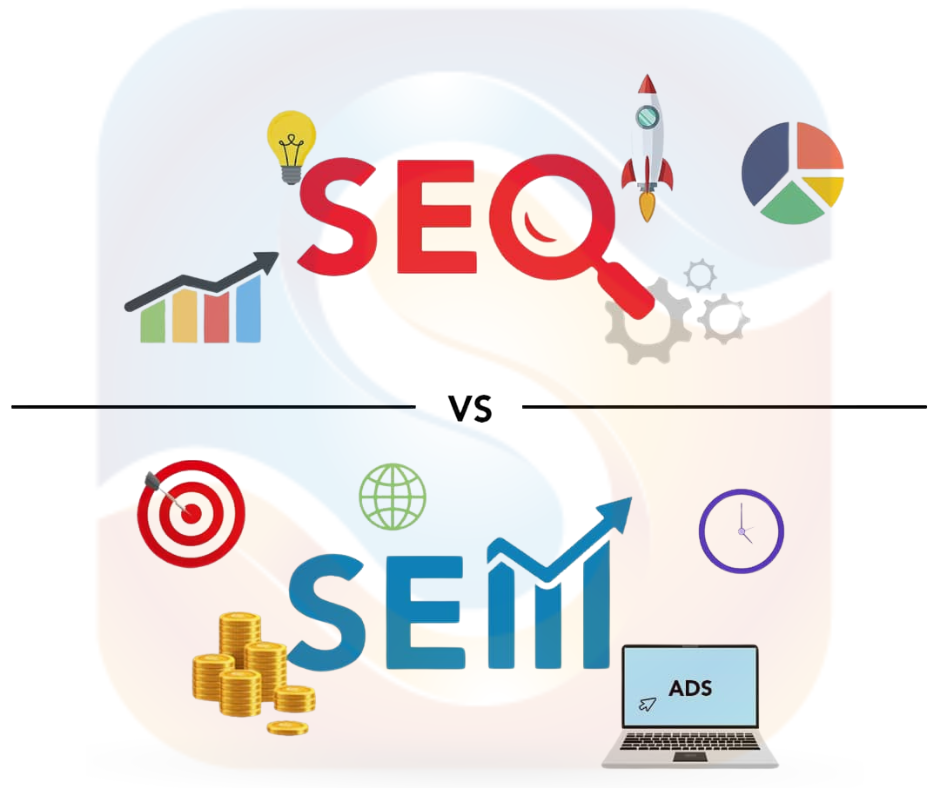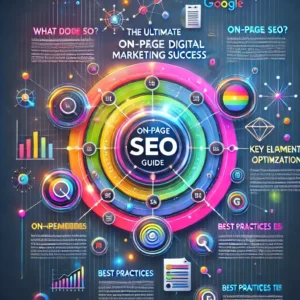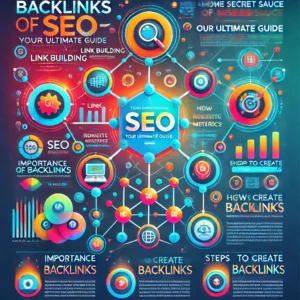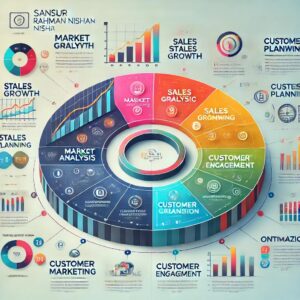Search Engine Optimisation (SEO) and Search Engine Marketing (SEM) are two key strategies to achieve higher visibility of a business in digital marketing. The two also serve different purposes and have their own benefits depending on your objectives and resources; both are essential.
Being a digital marketing and SEO expert in the USA, I know that many businesses find it hard to get the right answer for the concern of investing their time and budget. So in this blog, I will explain what the differences between them are as well as their strengths, and which one you should pick up for each situation based on your business goals.
Table of Contents
1. Understanding SEO and SEM
2. Benefits of SEO
3. Benefits of SEM
4. When to Use SEO, SEM, or Both
5. Key Differences Between SEO and SEM
6. How to Integrate SEO and SEM for Optimal Results
7. Conclusion
8. FAQs
1. Understanding SEO and SEM
SEO and SEM are both designed to increase your presence in search engine results, yet have different methods of approaching this.
SEO (Search Engine Optimization): The process of optimizing the overall website to organically gain position with search engines. A long-term play centered on creating great content, improving website structure, and generating backlinks to rank visibility and eliminate the need for paying for ads.
SEM (Search Engine Marketing): SEM is paying to be at the top of search engine results pages (SERPs). SEM involves paying for ads that appear based on certain keywords and specific audiences, providing instant visibility and clicks.
To summarize, SEO lays the groundwork for organic growth over the long-term, and SEM gives you an immediate leg up.
2. Benefits of SEO
SEO is not an overnight success strategy. Now, let`s take a look at some of the reasons you need SEO as part of your digital strategy.
Value at Scale: After the initial up-front cost for SEO infrastructure, SEO has no associated cost and only grows in value over time, as opposed to any paid channel such as SEM. It can generate traffic over the years and can be a cost-effective solution in the long run.
Establishes Trust and Credibility: Top natural positions offer trustworthiness for your company. This means that when users constantly find your website appearing on the results of search, they will trust your brand more.
Organic Traffic: With SEO, you build a regular stream of users who funnel through your content. This minimizes the reliance on ads and ensures a steady flow of traffic to your website.
Assists in User Experience: In addition to the above, a good SEO also contributes to user experience by improving site speed, mobile optimization, and intuitive design that keeps the users on the site.
Search is Just the Beginning: Well-ranking, high-quality content offers more than just search, but also brand authority and higher chances of backlinks from reputable sources.
3. Benefits of SEM
SEO is about organic growth, but SEM is about paid strategies that yield faster outcomes. So here is the reason SEM may be right for some business:
Fast Results: For those wanting leads or sales in a hurry, SEM is the way to go as it will give you immediate ranks on desired keywords as your link should appear right on top of the SERPs.
Targeting Specific: SEM helps you to target certain demographics, locations, and search behaviors, which gives you the ability to make your ads directly reach in front of particular people.
Flexible Budgets: SEM empowers you to spend on ads as per your discretion. You can change the size based on the performance of the campaign, whether you have a small or large establishment.
Simplified Tracking and Improvement: Using tools like Google Ads, you can get advanced metrics that monitor the performance of your ads and help you shape your campaigns in advance for optimal outcomes.
Seasonal and Event-Related Promotions: If you are running any limited-time promotion or season offer, SEM can get you noticed and bring traffic much faster compared to SEO which takes longer to show results.
4. When to Use SEO, SEM, or Both
If your goal is long-term and sustainable, you should invest in SEO, but if you want a quick return on your investment (ROI), your SEM campaign might have an edge over it. Here are some of the things that many of us face:
When to Focus on SEO:
You are looking at growth that lasts — over the long haul.
Organic search is a way to drive brand authority and trust.
You are on a budget and want to be economical.
When to Focus on SEM:
For example, you want fast results for a new product launch.
You focus on a specific type of audience from high-intent searches.
You are working with a variable price range and want to keep your spending in check
When to Use Both SEO and SEM:
You want both instant results and long-term growth
You have a supply of business objectives, which all are on a different timeline.
You want to rule search results by being shown both organically and in paid listings.
5. Key Differences Between SEO and SEM
Understanding the core differences can help you align these strategies to your business needs.
| Feature | SEO | SEM |
|---|---|---|
| Cost | Generally lower over time, but requires initial investment in content and optimization | Requires consistent budget to maintain ad placement |
| Timeline | Long-term (months to years) | Short-term (instant visibility) |
| Sustainability | Sustainable traffic once ranking is established | Traffic stops when ad budget is exhausted |
| Visibility | Traffic stops when the ad budget is exhausted | Immediate placement at the top of search results |
| Audience Targeting | Limited to organic reach based on search queries | Highly customizable targeting for demographics, location, and intent |
6. How to Integrate SEO and SEM for Optimal Results
Both methods are typically best when integrated to maximize visibility and performance. That said, here are a few ways you can combine some synergy between SEO and SEM:
When building SEO, use SEM for high-intent keywords: As for those keywords that are tough competition → SEM will get you visible numbers immediately. In the meantime, you could also be optimizing for them with SEO and working your way up the organic ranking.
Use SEM Data to Inform SEO Strategy: You can analyze your SEM campaigns to see what keywords, ad copy, and targeting options offer the best performance; use this data to refine your SEO strategy. Leverage these insights to develop SEO content around those topics and keywords.
Double Listings in SERPs Domination: If you rank both on your organic and paid search results, which appear on the same page, you are killing it! Seeing your brand at least a couple of times in the results naturally increases the chances of a user clicking on your brand.
Depending on the goal of your campaign: for instance, a seasonal campaign may require easier implementation to make SEM a priority. Yet at the same time, you can build up SEO content about the same topic for organic traffic long after the campaign period.
7. Conclusion
In the end, balance is the best way to go. SEO is great for sustainable, long-term credibility, while SEM is perfect for instant, target audience visibility. A Powerful Paring That Can Get You Results On The Inside And The Outside — Today and For Good!
Whether a small company or a big name, the key is knowing the inherent advantages of SEO and SEM in crafting a comprehensive digital marketing strategy. Using a combination of both, you can generate more leads, attain brand authority, and remain viable for your growth in the online world.

FAQs
Table of Contents What Is the Difference Between SEO And SEM?
SEO targets organic and long-term growth by optimizing the visibility of your website in search engine results, while SEM provides immediate visibility through paid advertising.
Which is the best SEO or SEM for a low budget?
Response: SEO is typically much cheaper in the long run because once your content is optimized you do not have to keep paying to keep it ranked. On the other hand, SEM has a high chance of ROI relatively fast so if you need short-term results, then it will provide a solution in the range of a couple of weeks.
What is the role of SEM in enhancing SEO performance?
Responses: SEM will show you which keywords, topics, and audiences perform the best, so you can optimize your SEO strategy. Also, SEM campaigns can increase traffic to your website and a greater opportunity for brand awareness, which can also aid in organic search performance.
Is It Possible To Do SEO And SEM For The Same Keywords?
Answer: Yes, combining both strategies helps you improve visibility since it allows you to position them in organic and paid search results for the same keywords, thus increasing your credibility. This can help improve the chances of your site getting clicked on.
SEO vs SEM: How much time does SEO take to give results in comparison to SEM?
Response: SEO is a long-term strategy and will take time, months, or even years before yielding significant output. That said SEM will be visible immediately once campaigns are live, and you will have ads appearing right away.
The short answer is that both are essential but not for every business.
Answer: It really depends on what your goals are. SEO is equally important for consistent long-term growth, whereas SEM would be the thing for businesses with an immediate need for visibility. Both is best for the greatest impact, but again, each strategy can exist on its own depending on your goals.
Compared to SEO, how can I measure the success of SEM?
Typically, SEO success would be tracked via organic traffic, keyword rankings, and user engagement metrics. For SEM, we measure success via ad KPIs like click-through rate (CTR), conversion rate, and return on ad spend (ROAS).
This combination of SEO and SEM is your best bet for making sure that you can maintain the balance of targeting your audience and establishing your digital presence for the foreseeable future.
Final Thoughts
SEO vs SEM: There is no one solution to the question The final decision of which strategy you choose depends on your business needs, business, and goals. Use SEM if you want instant traffic with the exact targeting! On the other hand, if you aim to grow and build credibility in the long run, then SEO is mandatory. These businesses have come to realize that a combination of both strategies bets a better digital footprint, which is why SEO and SEM balance one another perfectly.
Assess your business goals, available resources, and target audience to determine which strategy fits your business best. Either way, you go, SEO or SEM is an indispensable asset for growing visibility and success in the competitive landscape of the digital world.





